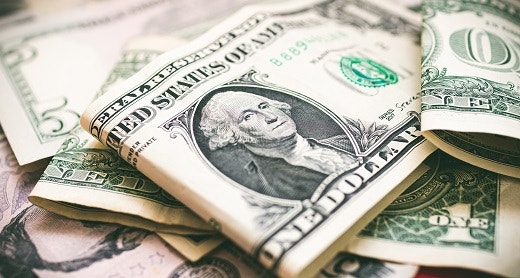Is US dollar a smart investment?
Explore why the US dollar is becoming an attractive investment, now at historic highs against key currencies. Assess the robust performance driven by strong US data and high interest rates.

Key points
- US dollar has risen over 5% YTD against a basket of currencies
- USD/JPY is trading at 38-year highs above 160.00
- US outperformance can be attributed in part to historically high interest rates combined with sustained economic growth
Should you hold cash in your portfolio?
The US dollar index, a measure of the currency's strength against a basket of others, has risen over 5% this year, driven by relatively strong US data and interest rates above 5%. For traders and investors, holding cash in USD could be a strategic move, especially in volatile markets or when anticipating further dollar strength.
Dollar highest since 1980s vs JPY
The USD/JPY currency pair has climbed above 160.00, marking a significant 38-year high. This milestone reflects the strong performance of the US dollar against the Japanese yen, affecting trade and investments between the two economies. While this can be attributed to US outperformance, it is important to observe that the yen is notably weak against all major currencies. Understanding this two-part dynamic is crucial for forex traders looking at potential market shifts.
Why is US dollar so strong?
The strength of the US dollar can be attributed to the higher interest rates set by the Fed, compared to other major economies including the UK, Euro Area, and Japan. This central bank action has permeated across the yield curve causing the US to boast the highest yield globally on 10-year debt as well. Higher rates often attract foreign capital looking for better returns, thereby boosting the dollar's value.
Alongside high interest rates, the US continues to report strong economic data, which bolsters investor confidence and enhances the attractiveness of the dollar. For example, the US continues to lead global economies in GDP growth, even with constraining interest rates. This combo promotes stronger investment in US assets, further supporting the currency’s robust position.
Should you buy US dollar?
Investing in the US dollar could be advantageous if US interest rates and economic performance continue to outshine those of other countries. Regions like the Eurozone have already begun reducing interest rates, while the US remains firm at 5.25 - 5.50%. Traders should keep a close watch on economic trends which may impact the dollar, ensuring informed trading decisions.
Will US dollar crash?
Currencies, including the US dollar, have historically been mean-reverting assets over long periods. While the dollar is currently strong, potential reversions could occur, influenced by shifts in economic policies or global financial climates. For example USD/JPY, currently above 160.00, has a long-term mean closer to 115.00. While historical price action does not dictate future direction, traders should be cautious and aware of these long-term movements when establishing forex strategies.
How to trade US dollar
- Open an account to get started, or practice on a demo account
- Choose your forex trading platform
- Open, monitor, and close positions on USD pairs
Trading forex requires an account with a forex provider like tastyfx. Many traders also watch major forex pairs like EUR/USD and USD/JPY for potential opportunities based on economic events such as inflation releases or interest rate decisions. Economic events can produce more volatility for forex pairs, which can mean greater potential profits and losses as risks can increase at these times.
You can help develop your forex trading strategies using resources like tastyfx’s YouTube channel. Our curated playlists can help you stay up to date on current markets and understanding key terms. Once your strategy is developed, you can follow the above steps to opening an account and getting started trading forex.
Your profit or loss is calculated according to your full position size. Leverage will magnify both your profits and losses. It’s important to manage your risks carefully as losses can exceed your deposit. Ensure you understand the risks and benefits associated with trading leveraged products before you start trading with them. Trade using money you’re comfortable losing.
